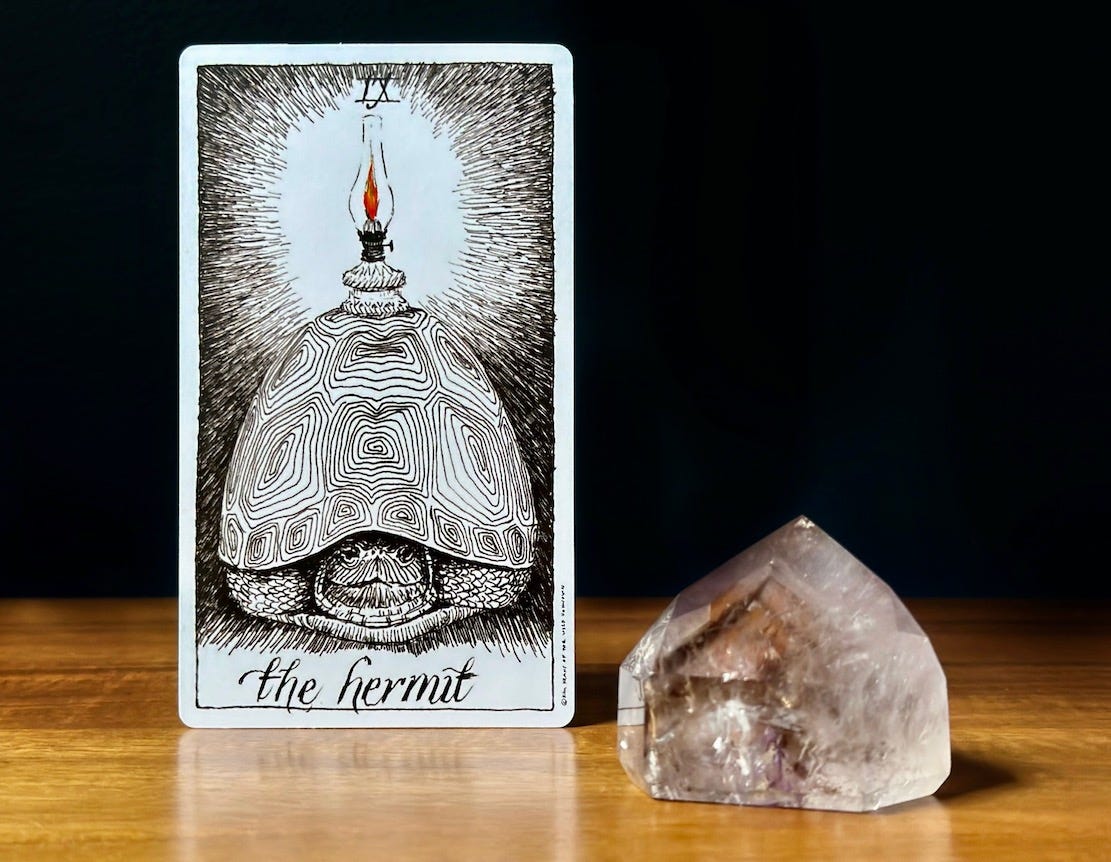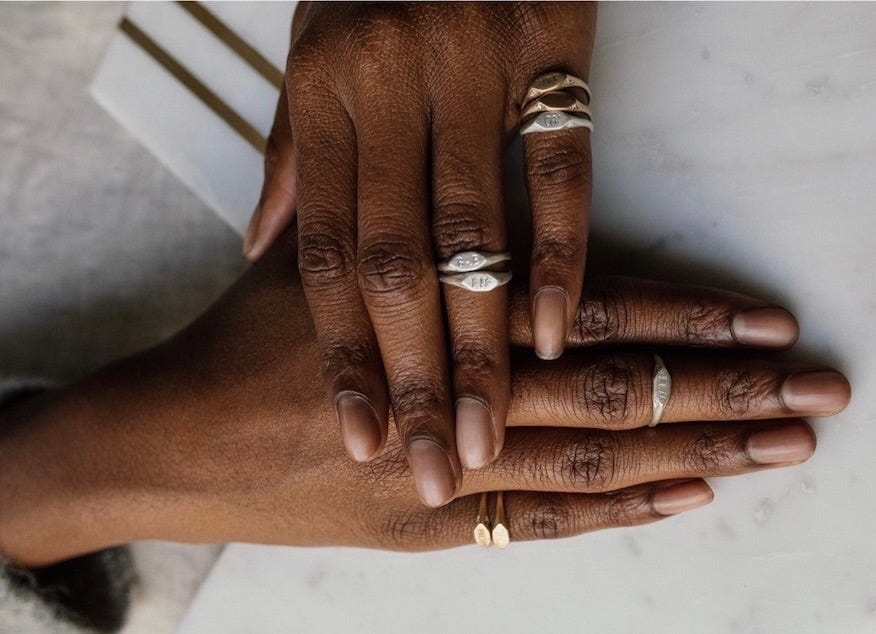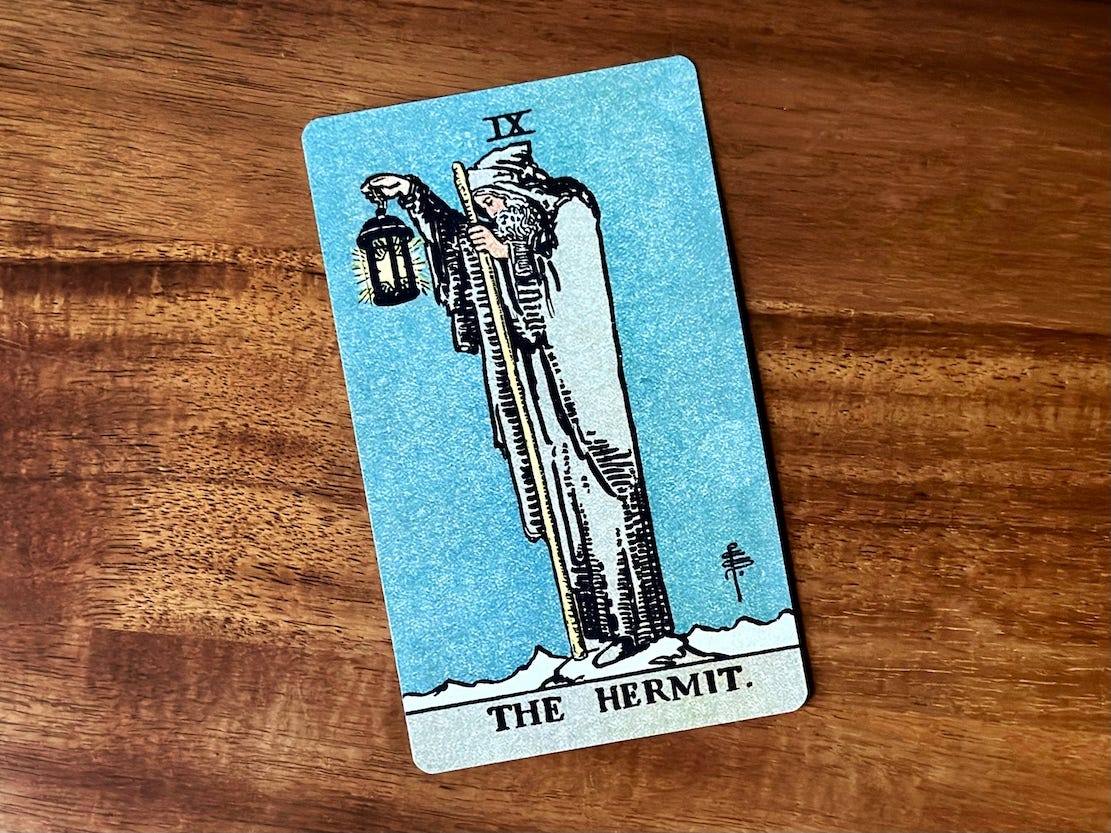10 Mean Reviews, 1 Big Takeaway
You can't please everyone. But neither can Beyoncé.
I read something recently that said when you turn 50, you stop giving a shit what other people think. (I’ve seen similar expressed about turning 40, 60, and 70.) While I adore this sentiment—and hope for all our sakes that it contains a grain of truth—I’d like to know if any of the people who say this write things for public consumption.
Does one ever stop giving a shit if a reviewer pans your book? Or slams your project? Or leaves a troll comment about a piece you poured your heart into? My friends across multiple decades seem to care quite a bit. But maybe we’re a sensitive lot.
To that end, I wanted to revisit this essay, originally published exactly one year ago. It’s a personal favorite (I reflect on these reviews time and again) and I hope it resonates.
Today’s card reading, as always, is brand new.
I recently read a novel that I loved.
It was one of those anomalous experiences where I was hooked from page one. I laughed. I cried. I grew irritated when other obligations meant I’d have to step away from reading. It was so enjoyable that I didn’t even feel envious that someone else had written it (a common occurrence when I adore something).
As soon as I finished, I texted a friend to tell her that she, too, must read it. “It was so good,” I gushed, scrolling to procure a link.
That’s when it happened.
Four stars? I blinked, furrowing my brow at the book’s average across multiple sites. Never mind that four stars is a very respectable, even excellent, rating in this trollful world of ours. Four stars is not five stars, and this read was flawless. What fault could anyone possibly find with this book?
Down the rabbit hole I went.
Whenever I’m struggling with the familiar creep of insecurity, there’s a game I play to make myself feel better. I’ll look up a book by a writer I deeply admire. Fiction or nonfiction, classic or contemporary, I try to pick an author or work that countless people emulate. A masterpiece. A paradigm. An indisputable contribution to the literary canon.
And then I read the reviews.
Every time I do this, I discover that no one is untouchable. It doesn’t matter if the person in question has won a Nobel or a Pulitzer or a National Book Award. It doesn’t matter if they’re dead. Someone out there—often quite a few someones—thinks their work could use some improvement.
If the likes of Nora Ephron or Toni Morrison or Lorrie Moore can garner reviews with comments like “disappointing,” “just OK,” and “not my thing,” then surely we would all be wise to take our own feedback with a grain of salt.
For a while, I blamed Amazon and Goodreads for our increasingly two-star culture. (Amazon is easy to blame for so many things.) But as it turns out, trolling from behind a faceless avatar is an age-old pastime, even for professional critics.
“The Times did not start requiring bylines until 1924, and writers could use the cloak of anonymity to be as brutal as they wished,” explains this New York Times piece on the classic novels their own reviewers once panned. “Once reviewers started putting their names on critiques, there was incentive for their assessments, even when negative, to be more nuanced.”
They were certainly not alone. There are countless examples of renowned works that were ripped to shreds or otherwise dismissed upon publication.
The next time your work is deemed less than stellar, reflect upon these gems:
“The writing of The Handmaid’s Tale is undistinguished… ordinary if not glaringly so. This is a serious defect, unpardonable maybe for the genre: a future that has no language invented for it lacks a personality. That must be why, collectively, it is powerless to scare.” — The New York Times, 1985
“Sentimental rubbish… Show me one page that contains an idea.” —The Odessa Courier, 1877, on Tolstoy’s Anna Karenina
“Mr. Huxley has the jitters… Brave New World is described by the publishers as ‘witty and wickedly satirical’… but it must stand on its merits as a lugubrious and heavy-handed piece of propaganda.” — Nation, 1932
“An unpleasant novel told in a very unpleasant way.” — The Saturday Review, 1891, on Hardy’s Tess of the D’Urbervilles
“The plan and technique of the illustrations are superb… but they may well prove frightening, accompanied as they are by a pointless and confusing story.” — Publisher’s Weekly, 1963, on Sendak’s Where the Wild Things Are
“It doesn’t even seem to be written. Instead, it gives the impression of having been shouted on to paper.” — The New Yorker, 1961, on Heller’s Catch-22
“Lolita is undeniably news in the world of books. Unfortunately, it is bad news. There are two equally serious reasons why it isn’t worth any adult reader’s attention. The first is that it is dull, dull, dull in a pretentious, florid and archly fatuous fashion. The second is that it is repulsive.” — The New York Times, 1958
“Monsieur Flaubert is not a writer.” — Le Figaro, 1857, in a review of Madame Bovary
“This sea novel is a singular medley of naval observation, magazine article writing, satiric reflection upon the conventionalisms of civilized life and rhapsody run mad… it repels the reader.” — The Spectator, 1851, on Melville’s Moby Dick
“It is no discredit to Walt Whitman that he wrote Leaves of Grass, only that he did not burn it afterwards.” — The Atlantic, 1867
In a word: ouch.
No matter who we are or what we do, criticism is a part of life.
There are jobs with built-in review cycles. There are Uber and Lyft ratings and Airbnb reviews. There are dates that seem to spark, yet never call. There are those who misunderstand us…and those who judge us without giving us a chance. Yet opinions (as most criticism boils down to someone’s opinion) are not fact. And they don’t always age well.
Even Beyoncé is not immune to an off-the-mark critical assessment. Her first solo album, Dangerously In Love, received a New York Times review baring the headline, “The Solo Beyoncé: She’s No Ashanti.”
Still, what becomes laughable in time can feel crushing in the moment.
In an ideal world, we would all learn to pay our critics no mind. We’d find it easy to brush off our disappointment, to trust that another’s opinion has no bearing on our worth. But we don’t live in an ideal world; we live in this one.
It behooves us to remember that nearly everything is subjective and open to interpretation. And to rest assured that when it comes to less-than-stellar endorsements, we are always (always) in excellent company.
In case you missed it: This week’s subscriber letter features a lovely interview about art, entrepreneurship, and trusting your intuition (with lots of universal takeaways). It also includes a giveaway, for a custom signet ring.
There’s still time to enter—the winner will be chosen on Wednesday, 8/23.
If you’d like to partake in this and other extras, like mini personalized tarot readings, AMAs, book recommendations, and interviews with inspiring people—not to mention support this publication and help make it sustainable—please consider joining. Every subscription helps!
Card of the Week
Here is this week’s card for the collective, as well as some thoughts to carry into the days ahead. As most modern readers will tell you, the tarot is not about fortunetelling, nor is it about neat, definitive answers. The cards are simply one path to reflection, a way of better knowing ourselves and others through universal themes. If this reading resonates with you, great! And if not, no worries. Take whatever may be helpful and leave the rest.

Humanity loves a label—introvert, extrovert, people person, loner…
There are 16 Myers-Briggs personality types, 9 Enneagram types, 12 zodiac signs, and countless other ways to explore, align, and identify. But at the end of the day, we’re all just creatures, absorbing and reflecting each other’s energy. Making our way through the world, doing the best we can.
When it comes to labels, The Hermit gets a bad rap. At first glance, they are sometimes regarded as antisocial, a lone wolf, an isolated misanthrope. Aloof, enigmatic, sullen. But The Hermit always has the last laugh.
This isn’t a card about seclusion, but rather about discovery. The Hermit’s list of hobbies includes uncovering truths, arriving at epiphanies, and shattering paradigms. To the untrained eye, this might look more like “walking” or “wandering” or “observing.” But for a seeker, even the most mundane outing has the potential to shift everything.
The Hermit does not succumb to FOMO and wishes we would follow their lead. You cannot go everywhere and do everything and expect to never burn out. Breaks are necessary. So is variation. Despite our anxiety about what might happen if we step away, the world will still be there when we return. (So will the work.)
A lot can be gleaned from a change of scenery. Travel, near or far, isn’t just about resting or exploring new places. It’s also about coming home and seeing the familiar with fresh eyes. It’s about discovering that, in fact, it’s nice to get back to the routine. (Or that it isn’t, and perhaps it’s time for a change.)
This card wishes to remind us that being alone is not the same as being lonely. This is the paradox of being human: in a crowded room, in the midst of conversation, even when bearing our soul to another, we see each moment in a way no one else can.
If you’ve ever been to a yoga class, you know the feeling. You may be guided by a teacher, surrounded by fellow practitioners, and yet the thoughts in your head as you relax into savasana are yours alone.
There are some things no one else can do for you, some conclusions you can only arrive at on your own. So, how do we uncover our truths? How do we restore ourselves, ground ourselves, meet ourselves exactly where needed?
The Hermit’s lantern always reminds me of the E.L. Doctorow quote about writing (that applies to so much more):
“Writing is like driving at night in the fog. You can only see as far as your headlights, but you can make the whole trip that way.”
We can, and whether we like it or not, we will.
Unless it’s born of excitement, anxious anticipation doesn’t do us any favors. This card asks us to anchor in the now. You don’t need to know every step of the way, or even what comes next. You just need to follow that stretch of light—your own internal guidance—and be nourished and encouraged by it.
You are not the contents of your calendar, the lines of your resume, the sum of your labels, the stars on your last review.
You are you—essence and wonder and breath and being. What better world is there to explore?












Loved this post! I am the hermit with a thousand passions and a million projects. I'm in my fifties and yeah, it's my experience that shortly after fifty is when it became far less relevant what people think of me. I have a better appreciation than ever for a world full of differing perspectives, rotten days, and unique background experiences. Not everyone likes me, or has the same taste as me. That's okay. So if I want to wear colorful ankle socks with my Birkenstocks, I will, because that what makes my feet feel good. People sometimes don't get my art, which doesn't feel great. But I'm starting to realize that some pieces might only be for me. And at this age I've made so very many lovely mistakes in my life that I want to give more attention to my mindset and what I can keep learning than to relying on others' approval to make me happy. That's what I'm working on anyway!
Caroline ~ “The secret of being a writer: not to expect others to value what you've done as you value it. Not to expect anyone else to perceive in it the emotions you have invested in it. Once this is understood, all will be well. (She wants to think!)”
i
From Joyce Carol Oates excellent Substack article, “An Unexpected Intimacy.”